by Manabu Noda*
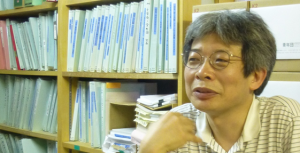
Oriza Hirata (b. 1962), playwright, director, theatre theoretician and educator, is a key figure in the Japanese theatre scene, winning numerous awards both in Japan and abroad. He founded his theatre company Seinendan (meaning “youth league”) in 1983, when he was a college student. Hirata’s staid, colloquial style coupled with a keen sense of history and occasional magic-realist twists marked a clear contrast with the more poetically flamboyant and physically hyperactive plays of the foregoing generations including Hideki Noda and Jūro Kara. His plays were dubbed as Quiet Theatre in the early 1990s, when his artistic originality was confirmed among the critical circle. He has also been prolific as a theatre theoretician. His numerous publications in this field include For the Contemporary Colloquial Theatre (1995), in which he theorized his theatrical methodology and discussed the possibility of truly modern theatre in Japan. This epoch-making book was enthusiastically received, and has been a source of great inspiration for the younger theatre artists in Japan.
Hirata is Artistic Director of his company and the Owner/Manager of the Komaba Agora Theatre, where his company is based. This house he founded has been instrumental in introducing various regional theatre companies from all over Japan to the Tokyo audience for over twenty years. These networking programmes at Agora built up experience and knowledge which led him to assume exterior artistic management: he was festival director of Toga Spring Festival (1999), and Artistic Director of Fujimi Culture Hall Kirari FUjimi, Saitama Prefecture (2002-07).
His international collaborative network started with Korea in 1993, and has been growing ever since, extending itself to countries including France, China, Australia, U.S., and Ireland. He was awarded both in Japan and Korea for Across the River in May (premiered at the New National Theatre, Tokyo, 2002), in which he collaborated with Japanese and Korean theater practitioners as co-author and co-director. HisIn the Heart of a Forest, loosely based on Conrad’s Heart of Darkness, was staged successfully in 2008 at Théâtre Royal Flamand, Belgium. Another most enduring international connection of his is with France, which started in 1998. His Tokyo Notes and Citizens of Seoul have been performed there numerous times, and his Par-dessus Bord, an adaptation from Michel Vinaver’s text, toured in Japan and France (2009-10).
As an educator in theatre creation, communication and arts policy, Hirata’s text based on his own workshop method has been adopted in junior-high textbooks in Japan. He has taught at several universities both in Japan and abroad. He was professor of theater course at Obirin University (2000-06), and then moved to Osaka University, Center for the Study of Communication-Design in 2006. His joint research project at Osaka University with Hiroshi Ishiguro, Director of Intelligent Robotics Laboratory, has produced many robot/android plays. Most recently, he was appointed by Tokyo University of Arts as Project Professor.
Hirata is also noted for his political achievements. He played a key role in Japan’s legislation in the field of arts management and subsidy policies, the act coming into effect in 2011. As Special Advisor to the Cabinet (October 2009 – August 2011), he had a hand in drafting the first policy speech for the then PM Yukio Hatoyama.
The following interview was held at Hirata’s office in Tokyo on 24 June 2014.
MANABU NODA: In your account of yourself and your company Seinendan during the first decade of your career, you said “It’s only through doing theatre that I can feel connected to others” (27)[1]. In other words, your motivation for making theatre was very personal. Was there any shift of perspective from personal to public in the late 80s, when you began to establish your own theatrical methodology?
ORIZA HIRATA: My desire and goal as an artist has always been to make myself understood. That hasn’t changed at all. I was keenly aware from the beginning, though, that my sort of theatre would not attract an audience of ten, twenty thousand. So, I wanted to create a society where coming to see my show would be many people’s natural choice – very egoistic as a motivation. I am now engaged in education, teaching subjects like communication and cultural policy at the university level. The motivation, again, is egoistic, and I understand I’ve got my share of critics out there, but I’ve publicly pointed out that my employers are to blame (laughs).
In the same book, you quote what you wrote at the age of 22: “You might not have the slightest idea what someone is trying to say, but you do understand that the person has something to say. If your goal is simply to tell others ‘I am here,’ this situation alone is tantamount to your goal achieved.” I believe this shows your personal take on artistic motivation. On the other hand, just around the same time, you wrote that because the Japanese “evidently lack the sensibility concerning universal propositions,” you were working on “further improving the Japanese language so that it can cope with Western logic” through “seeking for the form which is appropriate to the language” (74-75). That, I suppose, is the public side of your artistic interest in the possible form of Japanese that can convey universals.
In my undergraduate days, I majored in philosophy. I read Hegel and Kant, and with the help of footnotes and commentaries, I could understand what they were saying. However, the writings of Kitarō Nishida (philosopher, 1870-1945) were totally beyond my comprehension despite the fact that he wrote in Japanese (laughs). So, I thought, well, if the Japanese language as it is cannot embrace western philosophical thinking, what’s the use of studying philosophy? Importing knowledge is worthwhile in itself, but if philosophy is a discipline that pursues human truth, it is essential for the Japanese to use the Japanese language in that pursuit. That was when my interest in language itself grew. I went to Korea to study Korean, which is supposed to be similar to Japanese, and I started to form many ideas while I was there — ideas which were to be the basis of my theory and methodology.
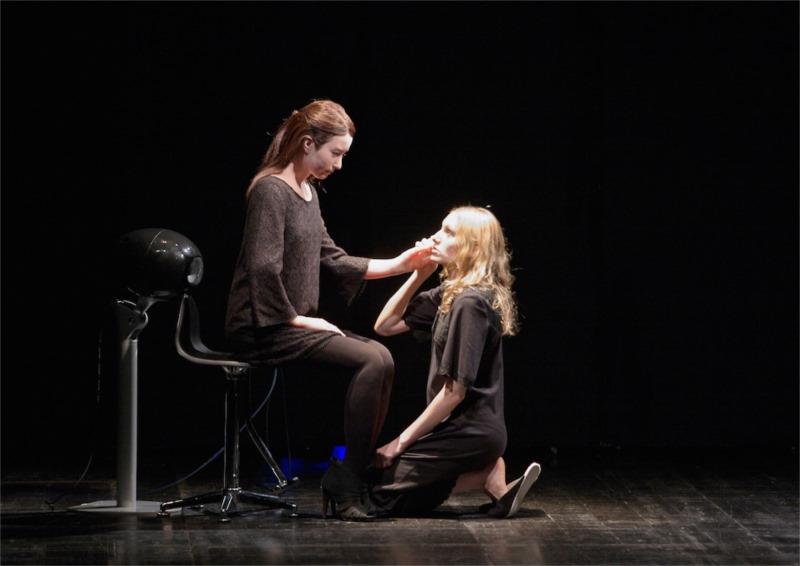
Around the years 1986 and 87, you wrote that actors should give what is beyond the verbal, because the words are given by the playwright in the first place. Your interest seems to have moved from static text to dynamic verbal intercourse.
Even now I think of myself as a playwright rather than a director. What I realized back then was that we don’t talk like that. The kind of Japanese like Nishida’s constrains actors. When I started directing, I found out that so many problems could be dealt with at the writing stage — tweaking the word order, for instance. This had a huge impact in the rehearsal room. My career as a director was triggered by these discoveries in real-life language use.
So your praxes as a playwright and as a director have developed alongside your pursuit of better dramatic Japanese.
Play writing also involves craftsmanship. It’s like pottery: when you come up with a new technique, you naturally get excited about what kind of tea cup you end up with. So, I think there are two sides: me in pursuit of Japanese as a better dramatic language, and me as a craftsman. In the past fifteen years, I have also worked outside Japan, like in Korea and France. That opened me up a little bit more. I work in Japanese, but my exposure to other languages has brought about changes in me. At present my main artistic interest lies in those changes.
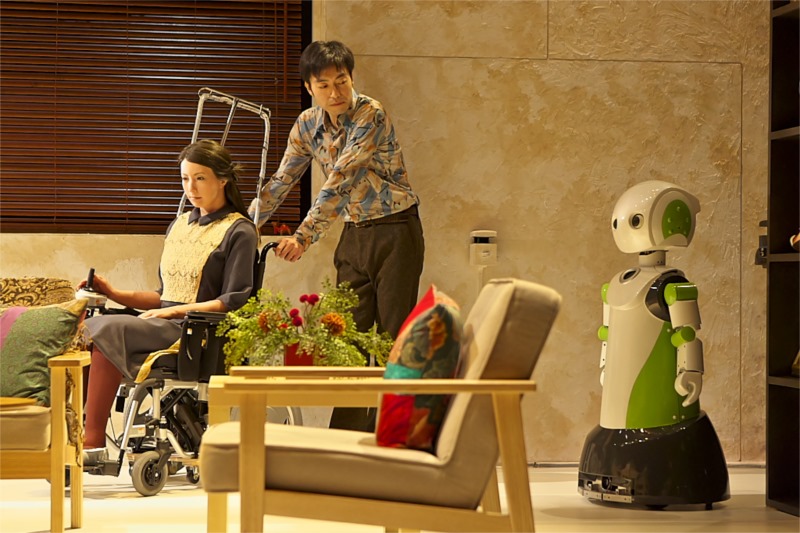
In 1999 you wrote, “We should share the recognition that we (Japanese) have yet to establish the rules of oral communication. This is a fact we must face in making our start: at present, we have no established correctness or beauty in our language” (170). What did you mean? Were you implying that we have to search for whatever is intrinsically Japanese from that premise, or that you would take the lead in creating the rules?
Um… both (laughs). As I said, my main artistic motive is egoistic, but there are other motives as well, one of which is to create a dialogue which can serve as a model in practising democracy. The chief difference between my plays and the Japanese plays which appeared before me, I think, is that my plays have dialogic structure. However, since the Japanese language as yet has little room to accommodate dialogue, I have long struggled to find the right situation for the Japanese to hold meaningful dialogue in our own language.
I began to use the word “dialogue” (taiwa) as opposed to conversation (kaiwa) around 1995, the year my book, For the Contemporary Colloquial Drama, was published. In the book, I argued that creating dialogue is requisite for us Japanese to achieve true modernity in our drama. Without dialogue, drama would become just a string of words, like political speech, like monologue, very sentimental…
There are two very important points for dialogue to be meaningful. First, both parties undergo change. It’s not a debate where one party wins or loses, but both change as a result of dialogue. Second, dialogue must be open – dialogue is a public practice, whereas conversation is private. I think theatre is ideal in providing opportunities for change through dialogue.
I have occasionally given lectures at universities in the West, and my take on dialogue as a requisite to modern drama seemed to create some cause for reflection. It appears that the difference between dialogue and conversation had long been so obvious to them that they hadn’t even bothered to pay attention. Surprisingly, if you look up the word dialogue on Oxford’s dictionary website (http://www.oxforddictionaries.com), the first definition goes, “conversation between two or more people as a feature of a book, play, or movie.” Perhaps, being an outsider, I was in a cultural position which enabled me to look at the issue from a perspective overlooked by westerners. In Japan, where no distinction between dialogue and conversation has been made, playwrights must write purposefully so that dialogue – not conversation — can develop.
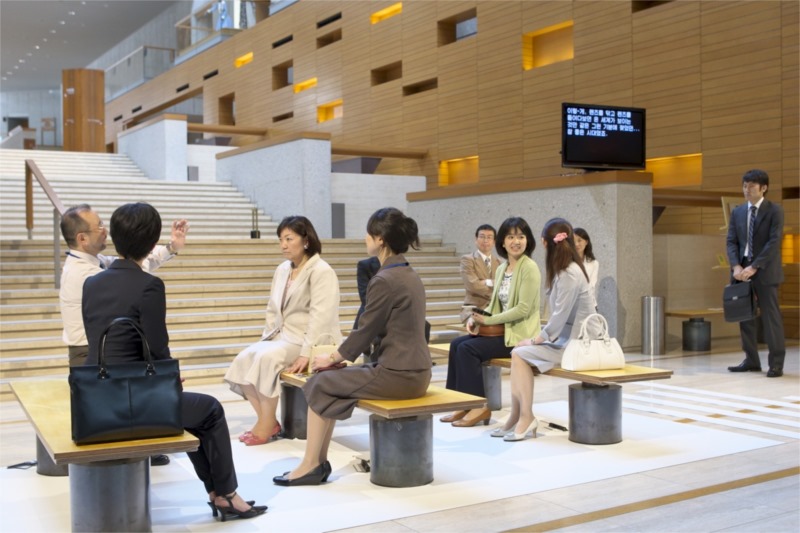
Artists can behave as an arbiter of beauty, but when you teach, you have to be democratic. Have you ever profited from holding dialogues with theatre critics or those outside the theatre?
Much of the artist’s creating process goes on unconsciously. That means that the end result contains something that was not under conscious control, and sometimes that something can have strong social relevance. Good producers, for example, are good at connecting the artists’ unconscious to society. I started teaching at universities and holding workshops thanks to Masao Nōso. Back then he was producer of Aoyama Theatre in the Round (Tokyo), and he found that something in me and encouraged me to teach. It doesn’t have to be producers. One great mission of theatre critics, I think, is to give description to what remains unconscious in the artist.
One difficulty, though, is that theatre criticism is an independent literary entity, and as such, it can meet artists’ needs and wants, but then again, it doesn’t have to. Dramaturgs are getting more and more attention in Japan these days, and their job is to cater to artists’ needs. There are many types of artists, of course, and while some are helped by dramaturgs, others prefer to work on their own. And there are cases in which intervention can be detrimental to the creative process. After all, artists can work without them – much of their work is unconscious, anyway. Rather, it is the public who need dramaturgs and critics. Having said that, even in this information-intensive society, there are artists who are not found until a hundred years later. If critics can help reduce that waiting period to fifty or thirty years, that is a good thing.
You are also active in the political arena, where controlled dialogue is imperative. Do you think theatre critics can be a party in political dialogue with theatre artists? What roles do you think critics in the 21st century can play in making dialogue more politically effective?
I am the owner-manager of Agora Theatre, which, as the name suggests, is meant to be a place for people to get together and hold dialogue. And I believe this sort of gathering place is of primary importance. Of course, dialogue can take place at the theatre – in my theatre it does happen, literally. I also think theatre forms the core around which dialogue develops, be it on paper or the web.
My company is based in the Agora and has produced many young artists who are now established names in theatre. Why? Because in Japan our company alone has provided opportunities for mutual criticism grounded in a common language that has been formed as a result of having a shared educational background – I mean, they have all been exposed to my method. Simply stating personal likes and dislikes won’t lead to dialogue, and sadly I think many theatre people in Japan are still caught up in that phase. Dialogue requires a common understanding concerning what our sort of theatre aspires to, our policy, our way of seeing the world.
Another key element in opening up dialogue is having an international dimension. I envy Europe because when new theatrical realities like Limini Protocol appear, critics scramble to make sense of these new artists, contextualize them and address their views internationally. I appreciated it greatly when many critics discussed my shows in France. It was as if they were vying with each other, contextualizing my plays and pointing out what was new in my plays. That’s the strength of European theatre criticism. Critics there are eager to spot new talents, and address the international readership to introduce them, saying, “Hey, here’s a new style arising out of this and that particular cultural context. What do you think?” Unfortunately, that sort of international dimension is still lacking in Japan. Interculturality will become even more important in the 21st century. We definitely need people who can work as a cultural bridge.
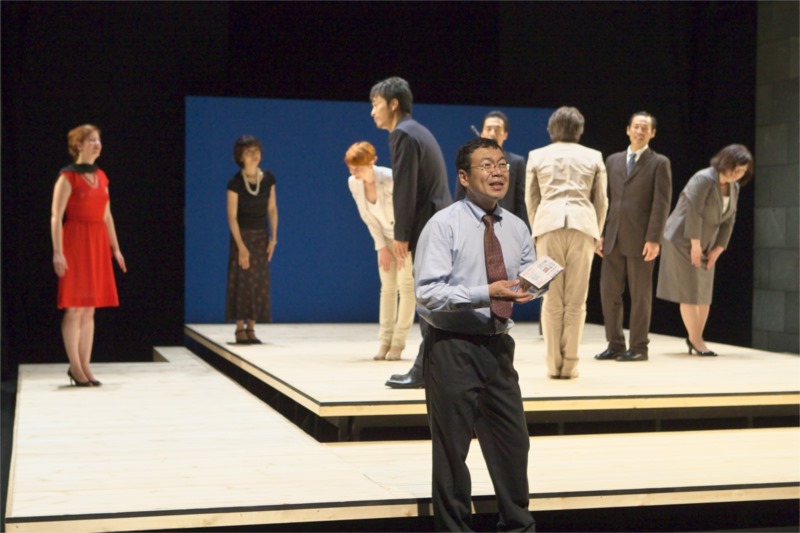
You have written plays that include robots and androids as characters. How should we place them in your pursuit for effective dialogue in theatre?
My robot/android theatre is just another form of puppet theatre. I suppose no one would criticize Bunraku puppet theatre for excluding human dialogue, but when we have robots and androids instead of puppets, there arises criticism of that sort. New media is bound to be criticized.
Robots and androids are a subject of my research, so I have an academic perspective on this as well. Those who criticize robot/android theatre may be thinking of robots that can perform complex tasks like those in science fiction. In reality, it’s difficult enough making human actors speak properly. Naturally, in the case of robots, the difficulty is greater. In terms of oral communication, robots are severely handicapped. So my research in this field – making robots speak – can help in the field of language education or in empowering people with autism. And it will help theatre education. There should be more cross-discipline exchanges in the study of the linguistically handicapped. I believe the accumulation of knowledge in the field of theatre education will serve the vast empowerment of people with communication problems. And since I seem to be the only one looking at this through the actual use of robots/androids in theatre, I believe my study can have great social impact.
Endnote
[1] All the quotes in this article are from Hirata, The Journey to Create a Map (Chizu-wo tsukuru tabi), Tokyo: Hakusuisha, 2004. All the translations in the article are Noda’s.
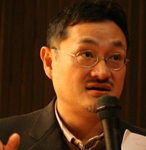
*Manabu Noda is Professor at Meiji University, Tokyo, Japan. As a theatre critic and researcher, he has written on British and Japanese acting and theatre history. He is currently on the editorial board of the Theatre Arts (IATC Japan).
Copyright © 2014 Manabu Noda
Critical Stages/Scènes critiques e-ISSN: 2409-7411
This work is licensed under the
Creative Commons Attribution International License CC BY-NC-ND 4.0.
